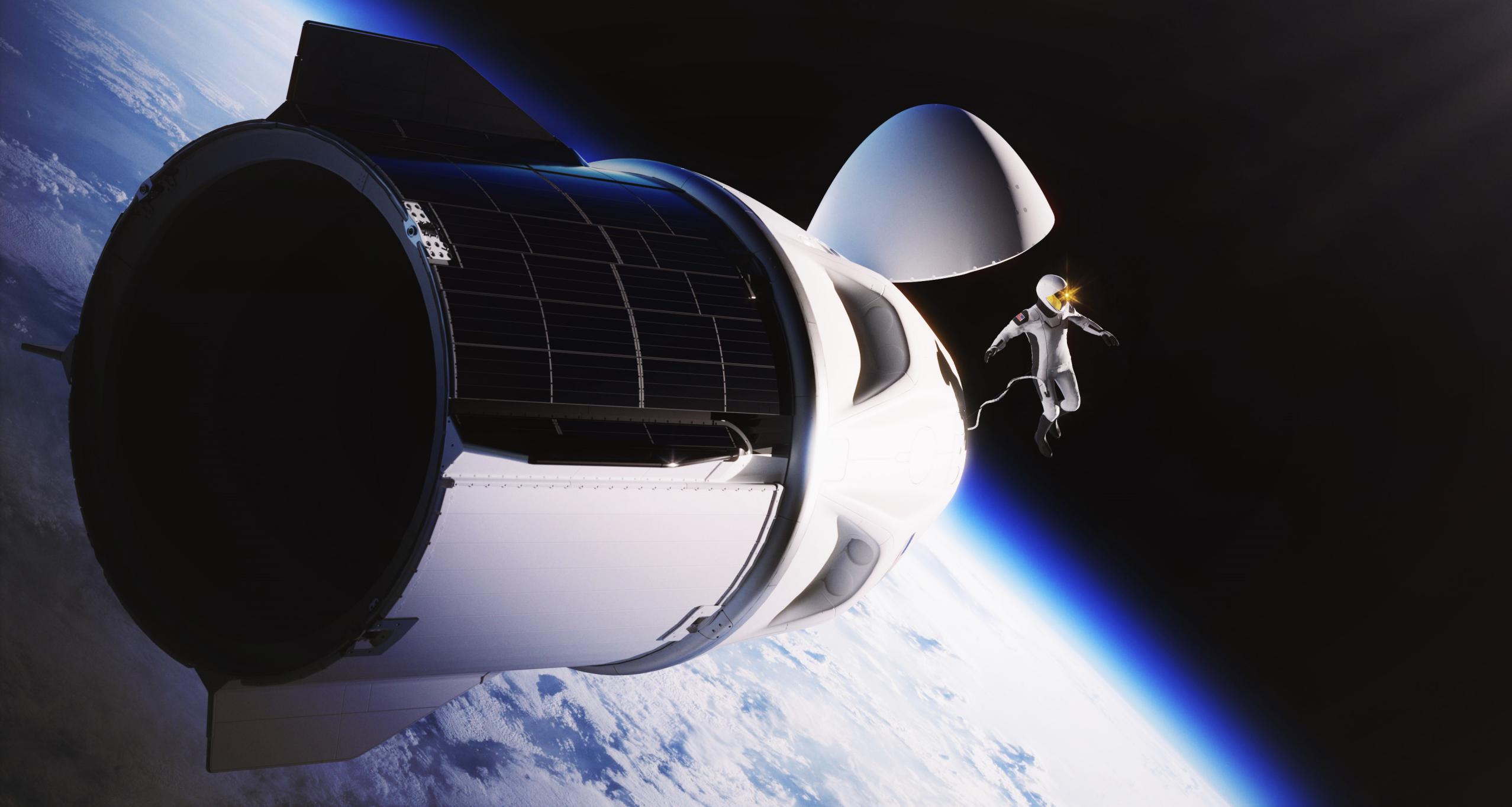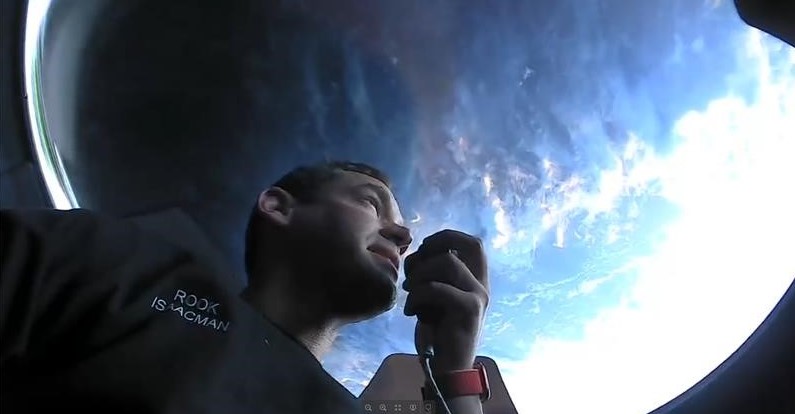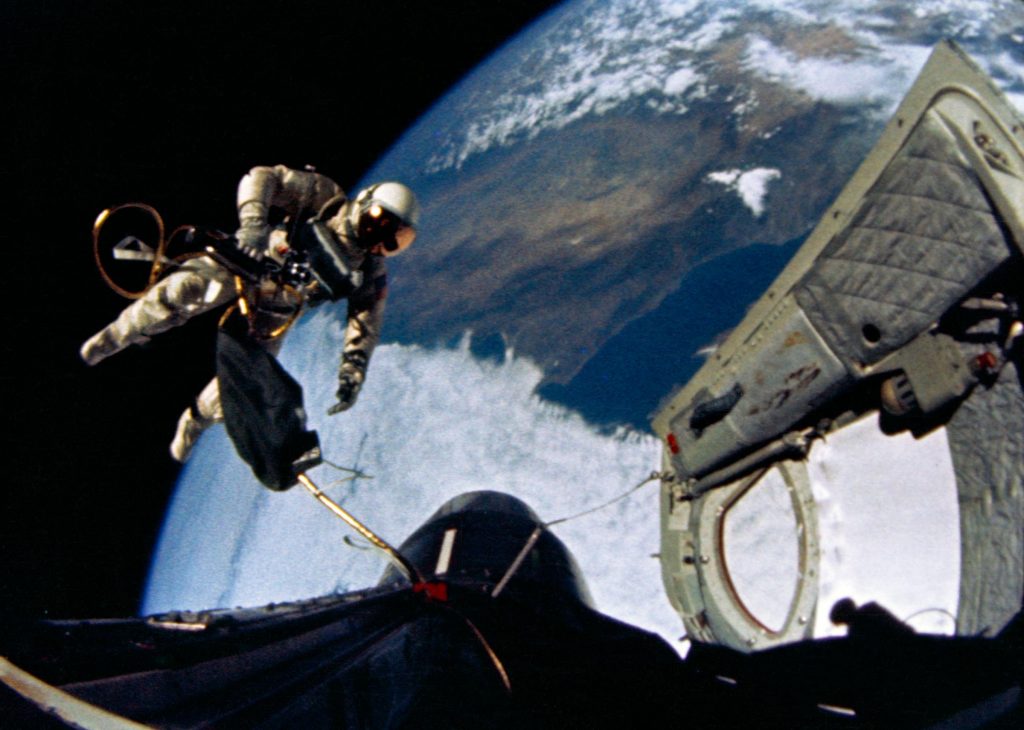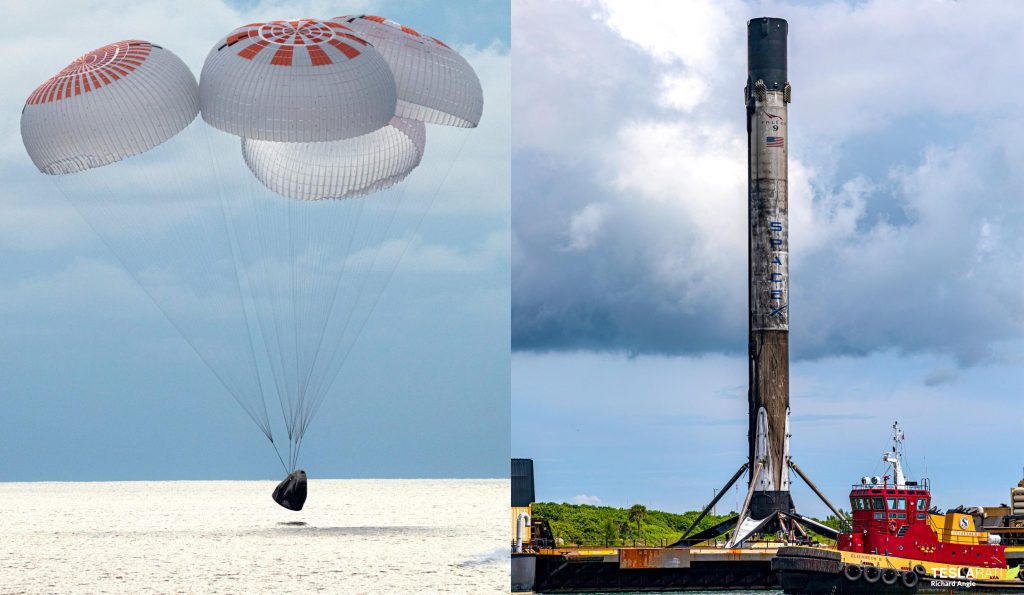

News
SpaceX, Polaris reveal plans to launch private astronauts higher than ever before
SpaceX and Inspiration4 creator Jared Isaacman have announced the Polaris Program, an initiative designed to carry the torch forward from Inspiration4 with even more ambitious private astronaut launches.
In September 2021, four astronauts became the first all-private crew to launch into orbit on a mission known as Inspiration4. First and foremost, I4’s goal was to uplift St. Jude’s Children’s Hospital and raise money for the fight against childhood cancer. It undeniably succeeded in that regard, raising almost a quarter of a billion dollars – about half of which came from public donations. The mission also catapulted SpaceX into the spotlight and appeared to mark the very beginning of the company’s private human spaceflight ambitions.
Combined with a separate program from Axiom Space, which has already booked four fully private astronaut missions to the International Space Station (ISS), the creation of the Polaris Program appears to confirm as much.

SpaceX now has six private Crew Dragon launches scheduled within the next few years. Polaris adds at least two missions, beginning as early as Q4 2022. Known as Polaris Dawn, the mission will be Crew Dragon’s second free-flyer mission after Inspiration4, meaning that the spacecraft will fly on its own for the full five-day duration. That gives SpaceX and the Polaris team far more freedom, freedom that they plan to take advantage of.
SpaceX aspires for Polaris Dawn to be the highest Earth orbit humans have traveled to since the 1960s and the furthest humans have been from the planet since the 1970s. NASA’s Apollo missions, which sent humans to the Moon, hold the all-time record, which Polaris Dawn will barely scratch the surface of. But in Earth orbit, the record – 1368 kilometers (850 mi) – was set by Gemini XI in September 1966.

With a drone ship landing for the booster, Falcon 9 is officially capable of launching around 12 metric tons (26,000 lb) to a circular 1400 km (870 mi) orbit. For unknown reasons, SpaceX and NASA have never acknowledged Crew Dragon’s mass at liftoff, but the first uncrewed vehicle weighed around 12 tons when it docked with the ISS. As such, it’s likely that Crew Dragon weighs at least 13 tons with a full crew of four astronauts. It’s possible that SpaceX can reduce Dragon’s mass or eke out more performance from Falcon 9 with a more aggressive booster landing further downrange, allowing the Polaris Dawn crew to narrowly beat the Gemini XI record.
If SpaceX went as far as expending a well-worn Falcon 9 booster for the mission, it’s likely that the mission could double or even triple the altitude record. If, like with Gemini XI, SpaceX launched Crew Dragon into an elliptical orbit, it could likely go even higher and easily beat the Gemini record while still recovering Falcon 9’s first stage.

Beyond the aspirational record-breaking altitude, Polaris Dawn will also debut SpaceX’s custom-built EVA (extra-vehicular activity) spacesuits, which are described as an overall upgrade to and replacement for the intra-vehicular (IVA) suits that already routinely protect NASA and private Dragon astronauts. The Polaris announcement is the first time SpaceX has publicly confirmed that it’s developing its own EVA suit. If it happens as planned, Polaris Dawn will mark the first private/commercial EVA in the history of spaceflight.
Finally, Polaris has plans for not one but three private astronaut launches. The second mission will follow in the footsteps of Polaris Dawn – likely with another Crew Dragon flight, though SpaceX and Polaris haven’t settled on a choice yet. The third mission, however, aims to be the first crewed launch of SpaceX’s next-generation Starship rocket and an essential pathfinder for DearMoon, a separate Starship launch contract that aims to send a crew of artists around the Moon as early as 2023.
News
Tesla UK sales see 14% year-over-year rebound in June: SMMT data
The SMMT stated that Tesla sales grew 14% year-over-year to 7,719 units in June 2025.

Tesla’s sales in the United Kingdom rose in June, climbing 14% year-over-year to 7,719 units, as per data from the Society of Motor Manufacturers and Traders (SMMT). The spike in the company’s sales coincided with the first deliveries of the updated Model Y last month.
Model Y deliveries support Tesla’s UK recovery
Tesla’s June performance marked one of its strongest months in the UK so far this year, with new Model Y deliveries contributing significantly to the company’s momentum.
While the SMMT listed Tesla with 7,719 deliveries in June, independent data from New AutoMotive suggested that the electric vehicle maker registered 7,891 units during the month instead. However, year-to-date figures for Tesla remain 2% down compared to 2024, as per a report from Reuters.
While Tesla made a strong showing in June, rivals are also growing. Chinese automaker BYD saw UK sales rise nearly fourfold to 2,498 units, while Ford posted the highest EV growth among major automakers, with a more than fourfold increase in the first half of 2025.
Overall, the UK’s battery electric vehicle (BEV) demand surged 39% to to 47,354 units last month, helping push total new car sales in the UK to 191,316 units, up 6.7% from the same period in 2024.
EV adoption accelerates, but concerns linger
June marked the best month for UK car sales since 2019, though the SMMT cautioned that growth in the electric vehicle sector remains heavily dependent on discounting and support programs. Still, one in four new vehicle buyers in June chose a battery electric vehicle.
SMMT Chief Executive Mike Hawes noted that despite strong BEV demand, sales levels are still below regulatory targets. “Further growth in sales, and the sector will rely on increased and improved charging facilities to boost mainstream electric vehicle adoption,” Hawes stated.
Also taking effect this week was a new US-UK trade deal, which lowers tariffs on UK car exports to the United States from 27.5% to 10%. The agreement could benefit UK-based EV producers aiming to expand across the country.
News
Tesla Model 3 ranks as the safest new car in Europe for 2025, per Euro NCAP tests
Despite being on the market longer than many of its rivals, the Tesla Model 3 continues to set the bar for vehicle safety.

The Tesla Model 3 has been named the safest new car on sale in 2025, according to the latest results from the Euro NCAP. Among 20 newly tested vehicles, the Model 3 emerged at the top of the list, scoring an impressive 359 out of 400 possible points across all major safety categories.
Tesla Model 3’s safety systems
Despite being on the market longer than many of its rivals, the Tesla Model 3 continues to set the bar for vehicle safety. Under Euro NCAP’s stricter 2025 testing protocols, the electric sedan earned 90% for adult occupant protection, 93% for child occupant protection, 89% for pedestrian protection, and 87% for its Safety Assist systems.
The updated Model 3 received particular praise for its advanced driver assistance features, including Tesla’s autonomous emergency braking (AEB) system, which performed well across various test scenarios. Its Intelligent Speed Assistance and child presence detection system were cited as noteworthy features as well, as per a WhatCar report.
Other notable safety features include the Model 3’s pedestrian-friendly pop-up hood and robust crash protection for both front and side collisions. Euro NCAP also highlighted the Model 3’s ability to detect vulnerable road users during complex maneuvers, such as turning across oncoming traffic.
Euro NCAP’s Autopilot caution
While the Model 3’s safety scores were impressive across the board, Euro NCAP did raise concerns about driver expectations of Tesla’s Autopilot system. The organization warned that some owners may overestimate the system’s capabilities, potentially leading to misuse or inattention behind the wheel. Even so, the Model 3 remained the highest-scoring vehicle tested under Euro NCAP’s updated criteria this year.
The Euro NCAP’s concerns are also quite interesting because Tesla’s Full Self-Driving (FSD) Supervised, which is arguably the company’s most robust safety suite, is not allowed for public rollout in Europe yet. FSD Supervised would allow the Model 3 to navigate inner city streets with only minimal human supervision.
Other top scorers included the Volkswagen ID.7, Polestar 3, and Geely EX5, but none matched the Model 3’s total score or consistency across categories. A total of 14 out of 20 newly tested cars earned five stars, while several models, including the Kia EV3, MG ZS, and Renault 5, fell short of the top rating.
Elon Musk
Why Tesla’s Q3 could be one of its biggest quarters in history
Tesla could stand to benefit from the removal of the $7,500 EV tax credit at the end of Q3.

Tesla has gotten off to a slow start in 2025, as the first half of the year has not been one to remember from a delivery perspective.
However, Q3 could end up being one of the best the company has had in history, with the United States potentially being a major contributor to what might reverse a slow start to the year.
Earlier today, the United States’ House of Representatives officially passed President Trump’s “Big Beautiful Bill,” after it made its way through the Senate earlier this week. The bill will head to President Trump, as he looks to sign it before his July 4 deadline.
The Bill will effectively bring closure to the $7,500 EV tax credit, which will end on September 30, 2025. This means, over the next three months in the United States, those who are looking to buy an EV will have their last chance to take advantage of the credit. EVs will then be, for most people, $7,500 more expensive, in essence.
The tax credit is available to any single filer who makes under $150,000 per year, $225,000 a year to a head of household, and $300,000 to couples filing jointly.
Ending the tax credit was expected with the Trump administration, as his policies have leaned significantly toward reliance on fossil fuels, ending what he calls an “EV mandate.” He has used this phrase several times in disagreements with Tesla CEO Elon Musk.
Nevertheless, those who have been on the fence about buying a Tesla, or any EV, for that matter, will have some decisions to make in the next three months. While all companies will stand to benefit from this time crunch, Tesla could be the true winner because of its sheer volume.
If things are done correctly, meaning if Tesla can also offer incentives like 0% APR, special pricing on leasing or financing, or other advantages (like free Red, White, and Blue for a short period of time in celebration of Independence Day), it could see some real volume in sales this quarter.
You can now buy a Tesla in Red, White, and Blue for free until July 14 https://t.co/iAwhaRFOH0
— TESLARATI (@Teslarati) July 3, 2025
Tesla is just a shade under 721,000 deliveries for the year, so it’s on pace for roughly 1.4 million for 2025. This would be a decrease from the 1.8 million cars it delivered in each of the last two years. Traditionally, the second half of the year has produced Tesla’s strongest quarters. Its top three quarters in terms of deliveries are Q4 2024 with 495,570 vehicles, Q4 2023 with 484,507 vehicles, and Q3 2024 with 462,890 vehicles.
-

 Elon Musk4 days ago
Elon Musk4 days agoTesla investors will be shocked by Jim Cramer’s latest assessment
-

 News1 week ago
News1 week agoTesla Robotaxi’s biggest challenge seems to be this one thing
-

 Elon Musk2 weeks ago
Elon Musk2 weeks agoFirst Look at Tesla’s Robotaxi App: features, design, and more
-

 News2 weeks ago
News2 weeks agoSpaceX and Elon Musk share insights on Starship Ship 36’s RUD
-

 News2 weeks ago
News2 weeks agoWatch Tesla’s first driverless public Robotaxi rides in Texas
-

 News1 week ago
News1 week agoWatch the first true Tesla Robotaxi intervention by safety monitor
-

 News2 weeks ago
News2 weeks agoTesla has started rolling out initial round of Robotaxi invites
-

 Elon Musk2 weeks ago
Elon Musk2 weeks agoTesla to launch in India in July with vehicles already arriving: report


















